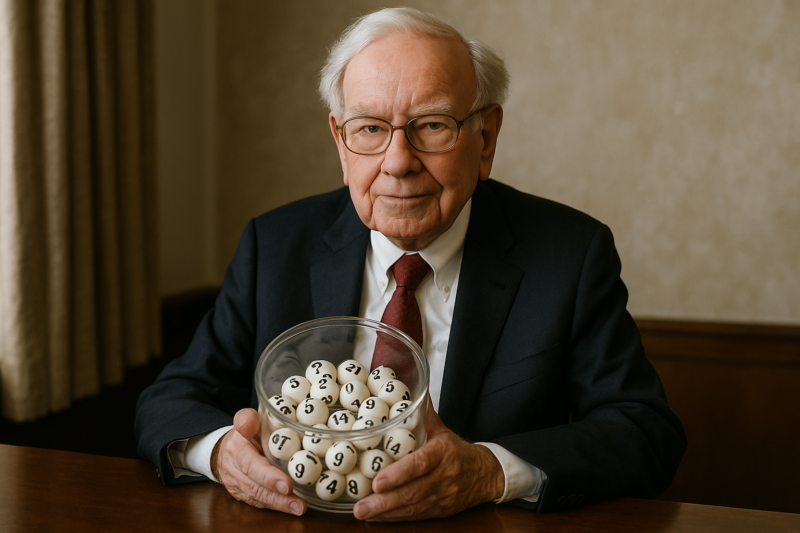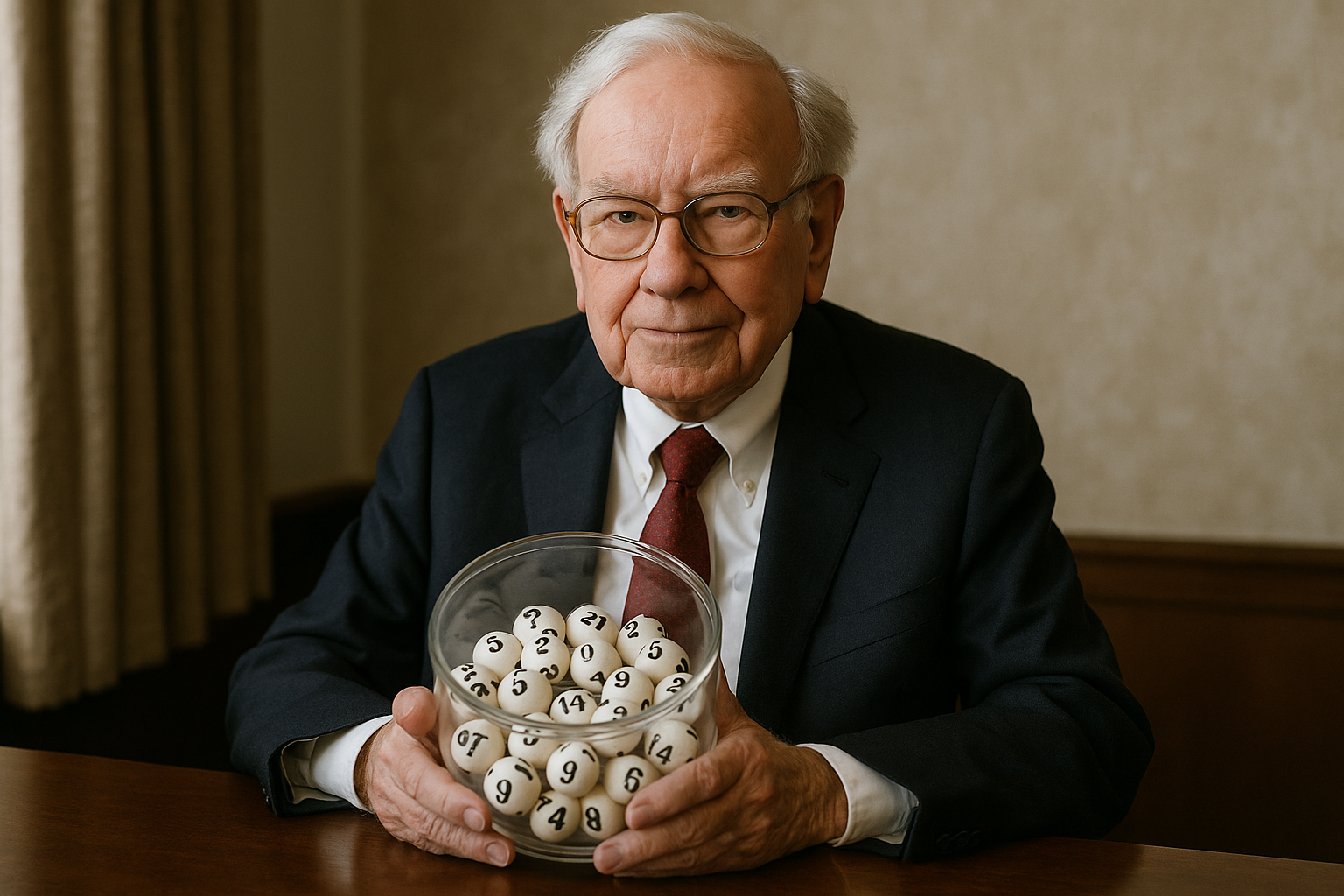
Key takeaways
Warren Buffett's theory on the lottery of life is a powerful reminder of the role of luck in shaping our destinies.
I suppose it’s easy to feel “extremely lucky” if your name is near the top for the richest person in the world!
This idea delves into the role of chance in our lives, emphasising how factors beyond our control significantly influence our opportunities and outcomes.
Buffett’s theory is a powerful reminder to me of the importance of humility, gratitude, and responsibility in our lives.
Warren Buffett, one of the most successful investors of all time, is not just known for his financial acumen but also for his profound insights into life and society.
In my mind, one of his most compelling concepts is the "lottery of life," often referred to as the "ovarian lottery."
This idea delves into the role of chance in our lives, emphasising how factors beyond our control significantly influence our opportunities and outcomes.
Buffett’s theory is a powerful reminder to me of the importance of humility, gratitude, and responsibility in our lives.

The Ovarian Lottery Explained
Here’s the basis of what Buffet explained to a group of University of Florida students:
I have been extraordinarily lucky.
I mean, I use this example and I will take a minute or two because I think it is worth thinking about a little bit.
Let’s just assume it was 24 hours before you were born and a genie came to you and he said:
Herb, you look very promising and I have a big problem. I got to design the world in which you are going to live in.
I have decided it is too tough; you design it. …
You say: I can design anything? There must be a catch?
The genie says there is a catch.
You don’t know if you are going to be born black or white, rich or poor, male or female, infirm or able-bodied, bright or retarded.
All you know is you are going to take one ball out of a barrel with 5.8 billion (balls).
You are going to participate in the ovarian lottery. And that is going to be the most important thing in your life, because that is going to control whether you are born here or in Afghanistan or whether you are born with an IQ of 130 or an IQ of 70. It is going to determine a whole lot.
What type of world are you going to design?”
So the term "ovarian lottery" refers to our nationality, gender, race, health, and family background.
These are obviously factors over which we have no control yet profoundly affect our life chances.
The Role of Luck in Success
Buffett's own life story is a testament to his theory.
Born in 1939 into a reasonably affluent family in the United States, he had access to quality education and opportunities that might not have been available had he been born in a different time or place.
He acknowledges that his success was also influenced by his being born into a predominantly male-dominated society at the time.
Buffett argues that while hard work, intelligence, and determination are crucial, the initial conditions set by the ovarian lottery can create significant disparities.
For example, a child born in a war-torn country or in extreme poverty faces hurdles that a child born in a stable and affluent environment does not.
The Best Time to Be Alive
Buffett also believes that the era we are born into plays a crucial role.
He has often remarked that there has never been a better time to be alive than today.
Despite the challenges and problems the world faces, the advances in technology, healthcare, and overall quality of life are unprecedented.
He points out that the average person today enjoys a better standard of living than even the wealthiest individuals of previous centuries.
This perspective is a reminder of the progress humanity has made and the potential for further improvement.
Implications for Society
The ovarian lottery theory has profound implications for how we view success and responsibility.
Buffett argues that those who are fortunate enough to draw favourable tickets in the lottery of life have a moral obligation to help those who are less fortunate.
This belief underpins much of his philanthropic work, including his decision to give away the majority of his fortune to charitable causes.
Buffett’s perspective encourages a sense of empathy and social responsibility.
It challenges the notion that success is solely the result of individual effort and merit, highlighting the importance of structural factors and collective action in addressing social inequalities.
Investing in Equality
One of the practical applications of Buffett's theory is in the realm of public policy and philanthropy.
If we acknowledge that much of our success is due to luck, it follows that we should strive to create systems that provide better opportunities for those less fortunate.
This can be achieved through investments in education, healthcare, and social services that help level the playing field.
Buffett’s own philanthropic efforts, alongside those of his close friend Bill Gates through the Giving Pledge, aim to address some of these structural inequalities. They focus on providing resources to improve public health, education, and economic opportunities globally.
A Personal Reflection
Let me ask you a question:
If you could put your ball back, and then took out, at random, a hundred other balls, and you had to pick one of those, would you put your ball back in?
Now, of those hundred balls … the majority of them would have you living in an underdeveloped country… Half of them are going to be below-average intelligence, half will be above.
Do you want to put your ball back? I think, you will not.
What you’re saying is:
I’m in the luckiest 1% of the world right now.
So Buffett’s theory of the ovarian lottery really offers a personal lens through which to view our lives.
It encourages us to reflect on our own circumstances and the factors that have contributed to our successes and failures.This reflection can foster a sense of gratitude for the advantages we have received and a commitment to using our resources and opportunities to make a positive impact.
Moreover, understanding the role of luck in our lives can make us more compassionate towards others.
It should also reduce the tendency to judge those who are less successful and increase our willingness to support policies and initiatives that promote social equity.
Conclusion
Warren Buffett's theory on the lottery of life is a powerful reminder of the role of luck in shaping our destinies.
I suppose it’s easy to feel “extremely lucky” if your name is near the top for the richest person in the world!
But I too have been lucky in my parents, lucky in marriage, lucky in good health, lucky in my career, lucky to live in a time and place where I could follow my passion for investing in real estate, lucky to live in a time and place with considerable freedom and not wrecked by war.
All this challenges the myth of the self-made individual and highlights the importance of empathy, gratitude, and social responsibility.

Note: By recognising the advantages we have received through the ovarian lottery, we can better appreciate our own lives and be grateful.
We should also become more committed to helping those who are less fortunate.
In a world where the gap between the rich and poor continues to widen, Buffett’s insights offer a path towards a more equitable and compassionate society.
By investing in systems and policies that provide opportunities for all, we can ensure that everyone has a fair chance to succeed, regardless of the ticket they drew in the ovarian lottery.














